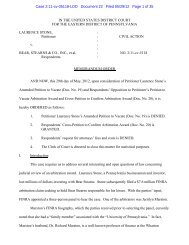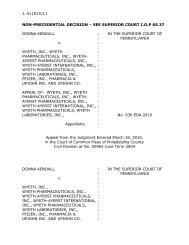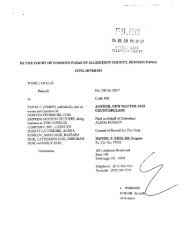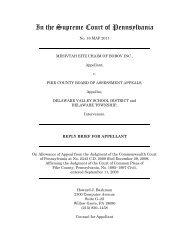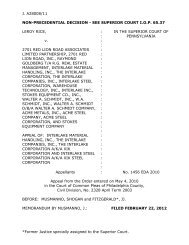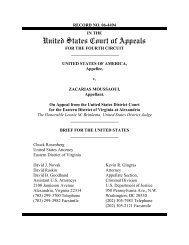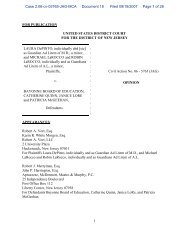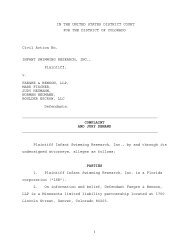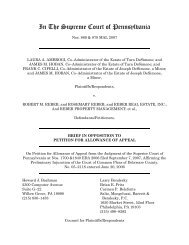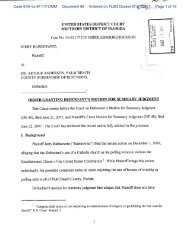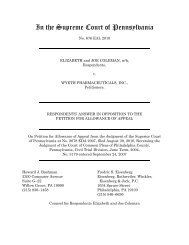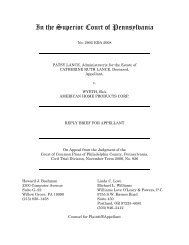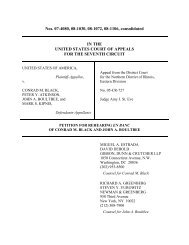OFFICE OF SENATOR MARK DAYTON, APPEL ... - How Appealing
OFFICE OF SENATOR MARK DAYTON, APPEL ... - How Appealing
OFFICE OF SENATOR MARK DAYTON, APPEL ... - How Appealing
Create successful ePaper yourself
Turn your PDF publications into a flip-book with our unique Google optimized e-Paper software.
--- S.Ct. ---- Page 1<br />
--- S.Ct. ----, 2007 WL 1461159 (U.S.)<br />
(Cite as: --- S.Ct. ----)<br />
<strong><strong>OF</strong>FICE</strong> <strong>OF</strong> <strong>SENATOR</strong> <strong>MARK</strong> <strong>DAYTON</strong>, <strong>APPEL</strong>-<br />
LANT<br />
v.<br />
BRAD HANSON<br />
No. 06-618<br />
United States Supreme Court.<br />
Argued April 24, 2007<br />
Decided May 21, 2007<br />
Syllabus FN*<br />
FN*The syllabus constitutes no part of the<br />
opinion of the Court but has been prepared<br />
by the Reporter of Decisions for the convenience<br />
of the reader. See United States v.<br />
Detroit Timber & Lumber Co., 200 U. S.<br />
321, 337.<br />
After his discharge from employment with former<br />
Senator Dayton, appellee Hanson sued appellant, the<br />
Senator’s office (Office), invoking the District<br />
Court’s jurisdiction under the Congressional Accountability<br />
Act of 1995 (Act). The court denied a<br />
motion to dismiss based on a claim of immunity under<br />
the Constitution’s Speech or Debate Clause, and<br />
the D. C. Circuit affirmed. The Office then sought to<br />
appeal under §412 of the Act, which authorizes review<br />
in this Court of “any … judgment … upon the<br />
constitutionality of any provision” of the Act.<br />
Held: This Court lacks jurisdiction under §412 because<br />
neither the dismissal denial nor the D. C. Circuit’s<br />
affirmance can fairly be characterized as a ruling<br />
“upon the constitutionality” of any Act provision.<br />
The District Court’s order does not state any grounds<br />
for decision, so it cannot be characterized as a constitutional<br />
holding. Moreover, neither the Court of Appeals’<br />
rejection of the Office’s argument that forcing<br />
the Senator to defend against Hanson’s allegations<br />
would necessarily contravene the Speech or Debate<br />
Clause, nor that court’s leaving open the possibility<br />
that the Clause may limit the proceedings’ scope in<br />
some respects, qualifies as a ruling on the Act’s<br />
validity. The Office’s argument that the appeals<br />
court’s holding amounts to a ruling that the Act is<br />
constitutional “as applied” cannot be reconciled with<br />
§413’s declaration that the Act’s authorization to sue<br />
“shall not constitute a waiver of … the privileges of<br />
any Senator … under [the Clause.]” Nor do any special<br />
circumstances justify exercise of this Court’s discretionary<br />
certiorari jurisdiction, the D. C. Circuit<br />
having abandoned an earlier decision that was in conflict<br />
with another Circuit on the Clause’s application<br />
to suits challenging a congressional Member’s personnel<br />
decisions. Pp. 2-4.<br />
459 F. 3d 1, appeal dismissed; certiorari denied.<br />
Stevens, J., delivered the opinion of the Court, in<br />
which all other Members joined, except Roberts,<br />
C. J., who took no part in the consideration or decision<br />
of the case.<br />
ON APPEAL FROM THE UNITED STATES<br />
COURT <strong>OF</strong> APPEALS FOR THE DISTRICT <strong>OF</strong><br />
COLUMBIA CIRCUIT<br />
Justice Stevens delivered the opinion of the Court.<br />
The Chief Justice took no part in the consideration or<br />
decision of this case.<br />
Prior to January 3, 2007, Mark Dayton represented<br />
the State of Minnesota in the United States Senate.<br />
Appellee, Brad Hanson, was employed in the Senator’s<br />
Ft. Snelling office prior to his discharge by the<br />
Senator, which he alleges occurred on July 3, 2002.<br />
Hanson brought this action for damages against appellant,<br />
the Senator’s office (Office), invoking the<br />
District Court’s jurisdiction under the Congressional<br />
Accountability Act of 1995 (Act), 109 Stat. 3, as<br />
amended, 2 U. S. C. §1301 et seq. (2000 ed. and<br />
Supp. IV), and alleging violations of three other federal<br />
statutes. FN1 The District Court denied appellant’s<br />
motion to dismiss the complaint based on a<br />
claim of immunity under the Speech or Debate<br />
Clause of the Constitution. FN2 The Court of Appeals<br />
affirmed, Fields v. Office of Eddie Bernice Johnson,<br />
Employing Office, United States Congress, 459 F. 3d<br />
1 (CADC 2006), the Office invoked our appellate jurisdiction<br />
under §412 of the Act, 2 U. S. C. §1412,<br />
and we postponed consideration of jurisdiction<br />
pending hearing the case on the merits, 549 U. S. ___<br />
© 2007 Thomson/West. No Claim to Orig. U.S. Govt. Works.
--- S.Ct. ---- Page 2<br />
--- S.Ct. ----, 2007 WL 1461159 (U.S.)<br />
(Cite as: --- S.Ct. ----)<br />
(2007). Because we do not have jurisdiction under<br />
§412, we dismiss the appeal. Treating appellant’s jurisdictional<br />
statement as a petition for a writ of certiorari,<br />
we deny the petition.<br />
Under §412 of the Act, direct review in this Court is<br />
available “from any interlocutory or final judgment,<br />
decree, or order of a court upon the constitutionality<br />
of any provision” of the statute. FN3 Neither the order<br />
of the District Court denying appellant’s motion to<br />
dismiss nor the judgment of the Court of Appeals affirming<br />
that order can fairly be characterized as a ruling<br />
“upon the constitutionality” of any provision of<br />
the Act. The District Court’s minute order denying<br />
the motion to dismiss does not state any grounds for<br />
decision. App. to Pet. for Cert. 59a. Both parties<br />
agree that that order cannot, therefore, be characterized<br />
as a constitutional holding. FN4 The Court of<br />
Appeals’ opinion rejects appellant’s argument that<br />
forcing Senator Dayton to defend against the allegations<br />
in this case would necessarily contravene the<br />
Speech or Debate Clause, although it leaves open the<br />
possibility that the Speech or Debate Clause may limit<br />
the scope of the proceedings in some respects.<br />
Neither of those holdings qualifies as a ruling on the<br />
validity of the Act itself.<br />
The Office argues that the Court of Appeals’ holding<br />
amounts to a ruling that the Act is constitutional “as<br />
applied.” According to the Office, an “as applied”<br />
constitutional holding of that sort satisfies the jurisdictional<br />
requirements of §412. We find this reading<br />
difficult to reconcile with the statutory scheme. Section<br />
413 of the Act provides that<br />
“[t]he authorization to bring judicial proceedings under<br />
[the Act] shall not constitute a waiver of sovereign<br />
immunity for any other purpose, or of the privileges<br />
of any Senator or Member of the House of<br />
Representatives under [the Speech or Debate Clause]<br />
of the Constitution.” 2 U. S. C. §1413.<br />
This provision demonstrates that Congress did not intend<br />
the Act to be interpreted to permit suits that<br />
would otherwise be prohibited under the Speech or<br />
Debate Clause. Consequently, a court’s determination<br />
that jurisdiction attaches despite a claim of Speech or<br />
Debate Clause immunity is best read as a ruling on<br />
the scope of the Act, not its constitutionality. This<br />
reading is faithful, moreover, to our established practice<br />
of interpreting statutes to avoid constitutional difficulties.<br />
FN5 See Clark v. Martinez, 543 U. S. 371,<br />
381-382 (2005).<br />
The provision for appellate review is best understood<br />
as responding to a congressional concern that if a<br />
provision of the statute is declared invalid there is an<br />
interest in prompt adjudication by this Court. To extend<br />
that review to instances in which the statute itself<br />
has not been called into question, giving litigants<br />
under the Act preference over litigants in other cases,<br />
does not accord with that rationale. This is also consistent<br />
with our cases holding that “statutes authorizing<br />
appeals are to be strictly construed.” Perry Ed.<br />
Assn. v. Perry Local Educators’ Assn., 460 U. S. 37,<br />
43 (1983); see also Fornaris v. Ridge Tool Co., 400<br />
U. S. 41, 42, n. 1 (1970) (per curiam).<br />
Nor are there special circumstances that justify the<br />
exercise of our discretionary certiorari jurisdiction to<br />
review the Court of Appeals’ affirmance of the interlocutory<br />
order entered by the District Court. Having<br />
abandoned its decision in Browning v. Clerk, U. S.<br />
House of Representatives, 789 F. 2d 923 (1986), the<br />
D. C. Circuit is no longer in obvious conflict with<br />
any other Circuit on the application of the Speech or<br />
Debate Clause to suits challenging the personnel decisions<br />
of Members of Congress. Compare 459 F. 3d<br />
1 (case below), with Bastien v. Office of Senator Ben<br />
Nighthorse Campbell, 390 F. 3d 1301 (CA10 2004).<br />
Accordingly, the appeal is dismissed for want of jurisdiction<br />
and certiorari is denied. We express no<br />
opinion on the merits, nor do we decide whether this<br />
action became moot upon the expiration of Senator<br />
Dayton’s term in office.<br />
It is so ordered.<br />
© 2007 Thomson/West. No Claim to Orig. U.S. Govt. Works.<br />
FN1. Appellee alleged violations of the<br />
Family and Medical Leave Act of 1993, 107<br />
Stat. 6, as amended, 29 U. S. C. §2601 et<br />
seq. (2000 ed. and Supp. IV), the Americans<br />
with Disabilities Act of 1990, 104 Stat. 337,<br />
42 U. S. C. §12101 et seq. (2000 ed. and<br />
Supp. IV), and the Fair Labor Standards Act<br />
of 1938, 52 Stat. 1060, as amended, 29
--- S.Ct. ---- Page 3<br />
--- S.Ct. ----, 2007 WL 1461159 (U.S.)<br />
(Cite as: --- S.Ct. ----)<br />
U. S. C. §201 et seq. (2000 ed. and Supp.<br />
IV).<br />
FN2. “[F]or any Speech or Debate in either<br />
House, [the Senators and Representatives]<br />
shall not be questioned in any other Place.”<br />
Art. I, §6, cl. 1.<br />
FN3. Section 412 reads in full:<br />
“Expedited review of certain appeals<br />
“(a) In general<br />
“An appeal may be taken directly to the Supreme<br />
Court of the United States from any<br />
interlocutory or final judgment, decree, or<br />
order of a court upon the constitutionality of<br />
any provision of this chapter.<br />
“(b) Jurisdiction<br />
“The Supreme Court shall, if it has not previously<br />
ruled on the question, accept jurisdiction<br />
over the appeal referred to in subsection<br />
(a) of this section, advance the appeal<br />
on the docket, and expedite the appeal to the<br />
greatest extent possible.” 2 U. S. C. §1412.<br />
FN4. Had the District Court’s order qualified<br />
as a ruling “upon the constitutionality”<br />
of a provision of the Act, the Court of Appeals’<br />
jurisdiction to hear the appeal would<br />
have been called into serious doubt. See 28<br />
U. S. C. §1291 (granting jurisdiction to the<br />
courts of appeals from final decisions of federal<br />
district courts “except where a direct review<br />
may be had in the Supreme Court”).<br />
FN5. Nor does this reading make a dead letter<br />
out of §412’s limitation of appellate review<br />
in this Court to constitutional rulings.<br />
The possibility remains that provisions of<br />
the Act could be challenged on constitutional<br />
grounds unrelated to the Speech or Debate<br />
Clause.<br />
U.S., 2007<br />
<strong><strong>OF</strong>FICE</strong> <strong>OF</strong> <strong>SENATOR</strong> <strong>MARK</strong> <strong>DAYTON</strong>, <strong>APPEL</strong>-<br />
LANT v. BRAD HANSON<br />
--- S.Ct. ----, 2007 WL 1461159 (U.S.)<br />
END <strong>OF</strong> DOCUMENT<br />
© 2007 Thomson/West. No Claim to Orig. U.S. Govt. Works.



